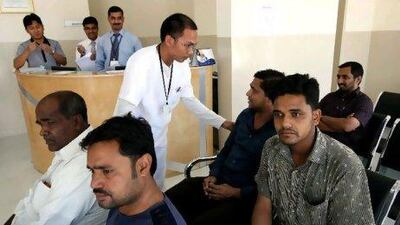Barely five years old, Abu Dhabi's innovative and mandatory health insurance scheme now benefits the overwhelming majority of the emirate.
More than 90 per cent of Emiratis and expatriates living in the capital are covered by some form of health insurance, said Dr Jamal Mohd Al Kaabi, the director of customer care and corporate communications at the Health Authority - Abu Dhabi (Haad) - the organisation in charge of implementing the scheme.
The current system replaced one implemented by the General Authority for Health Services in 2006, and watching the scheme grow in stature has been rewarding, said Dr Al Kaabi.
The relatively new scheme requires that employers and individual sponsors provide health insurance to workers and family members, including an employee's wife and up to three children under the age of 18.
"The main thing about the insurance is that we want something to drive the quality of health care. Now we are giving the power to the community. We are giving this card to everyone living in the emirate of Abu Dhabi so they can choose where to go," Dr Al Kaabi said.
"Today, if you are not happy with one hospital, there is nothing to tell you that you have to go to this hospital. You will choose the hospital that is appropriate for you."
With the extra power, the scheme also brings extra choice.
The previous plan covered only government employees. "Today, the health insurance system covers people in private and in public places," Dr Al Kaabi said.
Haad has also introduced several other health insurance schemes, including the Thiqa programme for Emiratis, the Aounak scheme for orphans and those with special needs and the Riaaya card for non-Emirati prisoners.
However, to improve the benefits to residents, the scheme relies on feedback from patients, said Ahmed Mohammed Khalifa Al Kindi, the section head of grievances and appeals.
"We almost achieved most of our goals, but we always want to do the best," Mr Al Kindi said.
In the past year, he said he had seen the number of complaints coming through to his department drop by 75 per cent, from roughly 200 to about 50. "Compare it with the last three years, the number of the complaints has gone down dramatically," he said.
But, Dr Al Kaabi said there was still plenty to be done.
"Since we started the scheme, it has been continuously improving when it comes to benefit schedules, when it comes to adding more benefits, when it comes to reducing exclusions, and when it comes to the network" of hospitals involved.
"Improvement has been going on for the last six years."
The insurance plan has also set a precedent for the rest of the country.
"Each emirate, they need an example, so Abu Dhabi took the lead," Dr Al Kaabi said.
Haad is working in collaboration with the Ministry of Health in the hopes of introducing a healthcare programme for the other emirates, a project that will require time and patience, he said.
But he added there was no certainty a scheme could be implemented in other emirates.
Dubai, which had originally planned to introduce its own system in 2009, announced last month that the deadline had been moved to 2013.
For Abu Dhabi, the scheme's success will give a boost to the entire country.
"We were talking about [this in] 2005, and now we are six years old, so still there are huge steps that need to be taken in the future and inshallah the Government supports this and we hope we will achieve all of our goals," Dr Al Kaabi said.
"If we have success in Abu Dhabi, this will give more strength to other emirates. They are watching us. Everybody is watching us, here in Abu Dhabi. Whatever we will do, and [if] we succeed with it, people will start implementing it."

